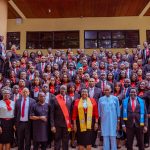By Kenneth Orusi
In Delta State, the administration of Governor Sheriff Oborevwori has been making significant strides in the pursuit of the MORE Agenda.
An ambitious blueprint aimed at advancing Meaningful Development, Opportunities for All, Realistic Reforms, and Enhanced Peace and Security.
At the forefront of this initiative is Mr. Charles Aniagwu, the Commissioner for Works, Rural and Riverine Roads, whose leadership and dedication have been instrumental in translating the agenda into tangible grassroots development, particularly in road infrastructure.
Roads are the lifeblood of any thriving community as they connect people to opportunities, foster economic activities, and enhance access to essential services such as education and healthcare.
Recognizing this, Mr. Aniagwu, has prioritized road infrastructure as a cornerstone of the MORE Agenda.
His focus has been to ensure that every corner of the State, particularly rural, where his powers are domicile, benefits from improved connectivity.
Under Aniagwu’s stewardship, the Ministry of Works has embarked on an extensive programme of road construction, rehabilitation, and expansion, with a particular emphasis on grassroots communities.
Some key projects include:
1. Opening Up Rural Areas: New roads are being constructed in previously inaccessible rural areas, providing farmers and small-scale entrepreneurs with direct access to markets and reducing transportation costs.
2. Rehabilitation of Dilapidated Roads: Strategic rehabilitation of deteriorated roads has not only improved safety but also restored the economic vibrancy of local communities.
3. Bridge Projects: Efforts to construct bridges in riverine and flood-prone areas have improved year-round accessibility, especially during the rainy season.
4. Kwale-Ogwashi-Uku Road
One of the flagship projects under the Oborevwori administration, this road connects multiple communities, reducing travel time and boosting local economies. Aniagwu has highlighted the importance of this project in opening up rural areas to markets and services.
5. Issele-Uku-Onicha-Ugbo Road
This strategic road links agrarian communities to urban centers, enabling farmers to transport their produce with ease. Aniagwu’s advocacy has drawn attention to how such projects can alleviate poverty and improve livelihoods.
6. Uvwie-Udu-Warri Link Road
Aniagwu has lauded this project for its potential to decongest major traffic routes and enhance commerce within Delta State’s urban and semi-urban areas.
Aniagwu’s approach to delivering road infrastructure aligns with the participatory philosophy of the MORE Agenda.
Local stakeholders, including community leaders and residents, have been asked to actively involved in identifying priority areas and monitoring projects.
This ensures that the roads built or rehabilitated directly address the most pressing needs of the people.
The benefits of these road projects are manifold. Improved road infrastructure has boosted small businesses, enhanced agricultural productivity, and reduced travel times.
Additionally, the creation of jobs during construction has provided temporary employment opportunities for many locals, further energizing the grassroots economy.
Mr. Aniagwu’s leadership in advancing the MORE Agenda through road infrastructure is a testament to his commitment to service and his belief in the transformative power of development at the grassroots.
By prioritizing the needs of underserved communities, he is not only fulfilling Governor Oborevwori’s vision but also leaving a lasting legacy of inclusion, progress, and hope for a better Delta State.
As the State continues its journey under the MORE Agenda, the emphasis on road infrastructure serves as a foundation for broader socio-economic growth.
With Aniagwu’s proactive approach, grassroots communities are no longer left behind but are instead becoming integral to the state’s development narrative.
Delta State’s story under the MORE Agenda is one of progress, unity, and a shared vision for a brighter future—and Charles Aniagwu’s role in bringing this vision to life is undeniably pivotal.
The importance of quality road infrastructure in fostering economic growth, social cohesion, and rural development cannot be overstated.
The Rural and Riverine Roads Commissioner, Aniagwu, who was the former Commissioner for Information in State and an avid advocate of Governor Oborevwori’s MORE Agenda, has consistently championed grassroots development through transformative road projects.
His efforts have demonstrated a keen understanding of the power of infrastructure in driving sustainable growth and empowering rural communities.
Aniagwu’s role extends beyond infrastructure development; he is deeply involved in grassroots engagement, ensuring that rural communities understand and support the government’s initiatives.
Through town hall meetings, radio programs, and social media campaigns, he has effectively communicated the benefits of the MORE Agenda to the people.
While the progress under Oborevwori’s administration is commendable, challenges persist. Budget constraints, weather conditions, and the sheer scale of infrastructure needs in Delta State pose significant hurdles.
Aniagwu has been vocal about these challenges, advocating for patience and understanding while emphasizing the government’s commitment to delivering on its promises.
Moreover, he has championed the need for maintenance culture, urging communities to take ownership of infrastructure projects to ensure their longevity.
Aniagwu’s call for collaboration between the government and citizens underscores his belief in participatory governance.
Charles Aniagwu’s contributions to grassroots development through road infrastructure advocacy are a testament to his dedication to Delta State’s progress.
His ability to connect with people, communicate complex policies in relatable terms, and inspire collective action has made him a trusted figure in Delta politics.
Aniagwu’s legacy is defined by his emphasis on inclusivity. He has consistently argued that the MORE Agenda is not just for urban centers but is deeply rooted in the transformation of rural areas.
By championing road infrastructure, he has illuminated the path to equitable development and economic empowerment.
The benefits of Aniagwu’s advocacy and Oborevwori’s road projects extend far beyond immediate convenience. They serve as catalysts for:
1. Economic Growth: Improved roads reduce transportation costs, enabling businesses to thrive and encouraging investment in rural areas.
2. Social Integration: Better connectivity fosters unity among communities, breaking down barriers of isolation.
3. Access to Essential Services: Roads provide easier access to schools, hospitals, and markets, improving the overall quality of life.
4. Youth Empowerment: Infrastructure projects create jobs, particularly for young people, contributing to a reduction in unemployment.
In the words of Aniagwu himself, “Development is not a privilege; it is a right for every citizen. Through roads, we build bridges—not just of infrastructure, but of trust and hope for a better tomorrow.”
Indeed, his work continues to inspire and empower, laying the groundwork for a Delta State that truly thrives.
Kenneth Orusi, is the Publisher and Editor-in-chief of The Story and Chairman, ICC, Delta NUJ.

















